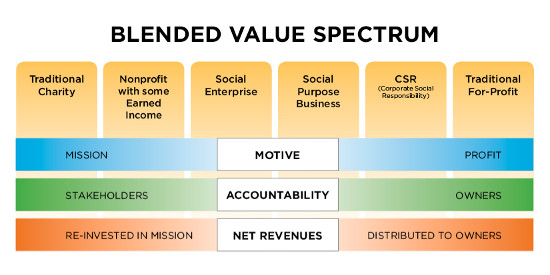All business is social.
Seems obvious to me but when I think about it, it goes a bit further:
• We are community tax payers
• We and our associates spend about half their waking hours at our location
• Recommendations are made and heeded, friendships and even marriages are formed at work
• Careers that feed, clothe and educate families are developed and sustained at work
So, even a business with no purposeful engagement in its community or charitable work of any kind has a culture that either promotes or takes away from the social good.
All non-profit organizations are businesses.
Equally obvious to me. Yet just as some traditional for-profit execs blanch at being called social, many traditional non-profit executives resist consideration of their business side. And yet,
• We take in and distribute money
• We file with the IRS, even if under a different status
• Our organizations require all the business disciplines a “business” requires – accounting, HR, operations, marketing and so forth
And so even the most traditional of charities, many who shy away from or even deny a business purpose and function – have both.
These understandings were pretty clear to me when I started the foundation. What was not so clear to me came in a lesson from Rick Aubry, who helped found Rubicon Bakery, many years ago. He taught me that there is a spectrum of blended value that has become more prominent over the last 25 years. His lesson, along with the content created by another friend, Sean McGee, is demonstrated in the slide below.

Every organization our foundation works with, (both profit and non) are working their way toward the middle of this spectrum. Here’s why.
There is risk in being fully traditional non-profit. You are entirely dependent on revenue streams that wax and wane. Government contracts, fund-raising, foundation backing all are good things but some of those revenue streams are more sturdy than others. And sound business practices that do not impinge on mission focus can make organizations more sustainable. We help NPs align their resources with their opportunities.
Fully traditional for-profits are also inherently neither good nor bad. Certainly these firms build communities just by their providing jobs for their workers. But here again, we see more success available to our for-profit companies when they reach toward the middle. We attract better workers (it is documendted that millenials look for more social engagement by their firms) and we are likely to be more durable through our involvement in social missions.
A good example of the latter by the way is that 700+ of our 850 restaurant workers are deeply affected by the living wage and safety discussions currently raging in our category. Demonstrating (not talking about) care around these issues is not just the right thing to do, it makes us more sustainable.
This topic has been a study for me for some time now. If it is interesting to you, please email me your thoughts and I’ll share a connection to a one-hour webinar I did recently on the social/business spectrum. At the very least, I hope I’ve encouraged you to think about where your organization fits on the spectrum. It’s worth considering and discussing with your team.





